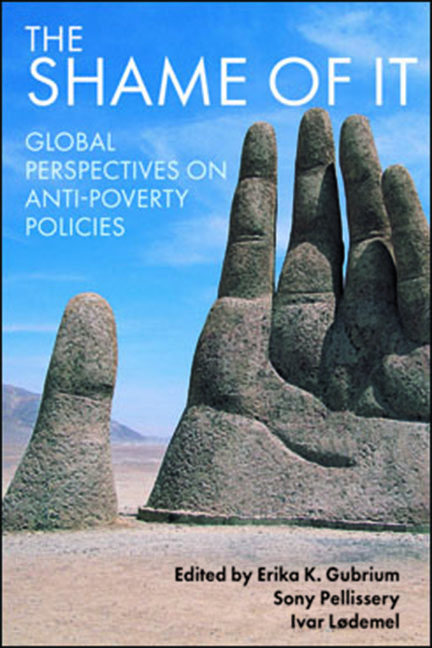Book contents
- Frontmatter
- Dedication
- Contents
- Notes on contributors
- Acknowledgements
- Preface
- one Resetting the stage
- two New urban poverty and new welfare provision: China’s dibao system
- three Thick poverty, thicker society and thin state: policy spaces for human dignity in India
- four Self-sufficiency, social assistance and the shaming of poverty in South Korea
- five ‘Not good enough’: social assistance and shaming in Norway
- six Pakistan: a journey of poverty-induced shame
- seven Separating the sheep from the goats: tackling poverty in Britain for over four centuries
- eight ‘Food that cannot be eaten’: the shame of Uganda’s anti-poverty policies
- nine Shame and shaming in policy processes
- ten Towards global principles for dignity-based anti-poverty policies
- Index
eight - ‘Food that cannot be eaten’: the shame of Uganda’s anti-poverty policies
Published online by Cambridge University Press: 03 February 2022
- Frontmatter
- Dedication
- Contents
- Notes on contributors
- Acknowledgements
- Preface
- one Resetting the stage
- two New urban poverty and new welfare provision: China’s dibao system
- three Thick poverty, thicker society and thin state: policy spaces for human dignity in India
- four Self-sufficiency, social assistance and the shaming of poverty in South Korea
- five ‘Not good enough’: social assistance and shaming in Norway
- six Pakistan: a journey of poverty-induced shame
- seven Separating the sheep from the goats: tackling poverty in Britain for over four centuries
- eight ‘Food that cannot be eaten’: the shame of Uganda’s anti-poverty policies
- nine Shame and shaming in policy processes
- ten Towards global principles for dignity-based anti-poverty policies
- Index
Summary
Introduction
Over the past 25 years, the varying approaches encompassed within Uganda's anti-poverty effort have been touted as a best case model in the developing world (Hickey, 2011). Uganda is a land-locked country lying astride the equator in east central Africa. It is closely linked by economic and colonial history to Kenya in the east, Tanzania in the south, South Sudan and the Democratic Republic of Congo (DRC) to the north and west respectively, and Rwanda in the southwest. Agriculture is the mainstay of the economy, contributing 31 per cent of the gross domestic product (GDP), 85 per cent of exports and employing at least 77 per cent of the active labour force (MFPED, 2004; UBOS, 2007). This agricultural influence has resulted in an economic system dependent on rain-fed crops and livestock farming. As Uganda has yet to develop and adopt irrigation and water harvesting technologies to any significant extent that could reduce the country's dependence on rain-fed agriculture (UNDP, 2005; UBOS, 2010), the country's economic health has been subject to the vagaries of weather and climate.
With a per capita GDP of US$1,457 in 2003 (UNDP, 2005) and a per capita income of US$334 in 2005 (UNDP, 2005), Uganda was and remains ranked among the poorest countries in the world. Rural poverty has been influenced by a combination of factors, including the slow growth of the agricultural sector and low prices of agricultural products; decreasing soil fertility and crop yields; malnutrition and a heavy disease burden including HIV/AIDS, malaria and tuberculosis; gender inequalities in access to productive resources; and a lack of focus on the poorest in public sector investment to support agriculture.
Endemic corruption is also a key challenge that pervades all aspects of life. Said to be a legacy of colonial rule, it arguably impeded Uganda's economic development in the decades of autocratic rule following independence (Ruzindana, 1997). During the era of democratic reform, the Museveni government and its National Resistance Movement (NRM) promised ‘clean government’, both in its push to be elected in the mid-1980s and post-election in an effort to appeal to international donors. Corruption, however, has since remained a serious problem (Flanary and Watt, 1999; Akello, 2012; Izama, 2012). International aid was withdrawn in 2012 in response to rampant violations (Ford, 2012).
- Type
- Chapter
- Information
- The Shame of ItGlobal Perspectives on Anti-Poverty Policies, pp. 157 - 178Publisher: Bristol University PressPrint publication year: 2013



